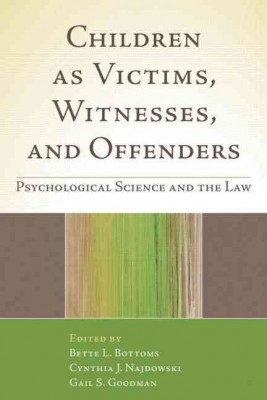| Children as Victims, Witnesses, and Offenders: Psychological Science and the Law Contributor(s): Bottoms, Bette L. (Editor), Najdowski, Cynthia J. (Editor), Goodman, Gail S. (Editor) |
|
 |
ISBN: 1606233327 ISBN-13: 9781606233320 Publisher: Guilford Publications OUR PRICE: $56.05 Product Type: Hardcover - Other Formats Published: August 2009 Annotation: Grounded in the latest clinical and developmental knowledge, this book brings together leading authorities to examine the critical issues that arise when children and adolescents become involved in the justice system. Chapters explore young people's capacities, competencies, and special vulnerabilities as victims, witnesses, and defendants. Key topics include the reliability of children's abuse disclosures, eyewitness testimony, interviews, and confessions; the evolving role of the expert witness; the psychological impact of trauma and of legal involvement; factors that shape jurors' perceptions of children; and what works in rehabilitating juvenile offenders. Policies and practices that are not supported by science are identified, and approaches to improving them are discussed. |
| Additional Information |
| BISAC Categories: - Psychology | Forensic Psychology - Law | Forensic Science - Political Science | Public Policy - Social Services & Welfare |
| Dewey: 362.880 |
| LCCN: 2009018939 |
| Physical Information: 1.3" H x 6.3" W x 9" (1.55 lbs) 412 pages |
| Descriptions, Reviews, Etc. |
| Publisher Description: Grounded in the latest clinical and developmental knowledge, this book brings together leading authorities to examine the critical issues that arise when children and adolescents become involved in the justice system. Chapters explore young people's capacities, competencies, and special vulnerabilities as victims, witnesses, and defendants. Key topics include the reliability of children's abuse disclosures, eyewitness testimony, interviews, and confessions; the evolving role of the expert witness; the psychological impact of trauma and of legal involvement; factors that shape jurors' perceptions of children; and what works in rehabilitating juvenile offenders. Policies and practices that are not supported by science are identified, and approaches to improving them are discussed. |